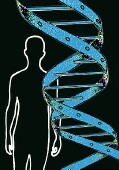Result of years of work by an international consortium of researchers
WEDNESDAY, Feb. 18, 2015 (HealthDay News) — Scientists have issued a comprehensive map of human epigenomes — the range of chemical and structural shifts that determine how genes govern health. The group published the new map online Feb. 18 in Nature, accompanied by simultaneous publication in six other sister journals.
The new map is the result of years of work by an international consortium of researchers. Experts say the new data will help scientists better understand how genetic disruption affects a wide range of illnesses, including autism, heart disease, and cancer. “The DNA sequence of the human genome is identical in all cells of the body, but cell types such as heart, brain, or skin cells have unique characteristics and are uniquely susceptible to various diseases,” researcher Joseph Costello, Ph.D., of the University of California in San Francisco, explained in a university news release.
Costello said that epigenomic factors effectively “allow cells carrying the same DNA to differentiate into the more than 200 types found in the human body.” By mapping the mechanics behind 111 key patterns of gene expression, the research team hopes it can shed light on how that differentiation process works — for either good or ill. The long-term goal, the researchers said, is to harness this new data to find better treatments for a wide range of cancers, autoimmune disorders, and other illnesses that affect critical organs, such as the heart, brain, or skin.
Costello is a member of the Helen Diller Family Comprehensive Cancer Center and is one of four directors of the U.S. National Institutes of Health’s Roadmap Epigenome Mapping Centers (REMC). The REMC consortium includes hundreds of researchers from the University of California Santa Cruz, the University of Southern California, and Washington University in St. Louis. Canadian members include both the Michael Smith Genome Sciences Centre and the University of British Columbia, both based in Vancouver.
Full Text
Copyright © 2015 HealthDay. All rights reserved.








